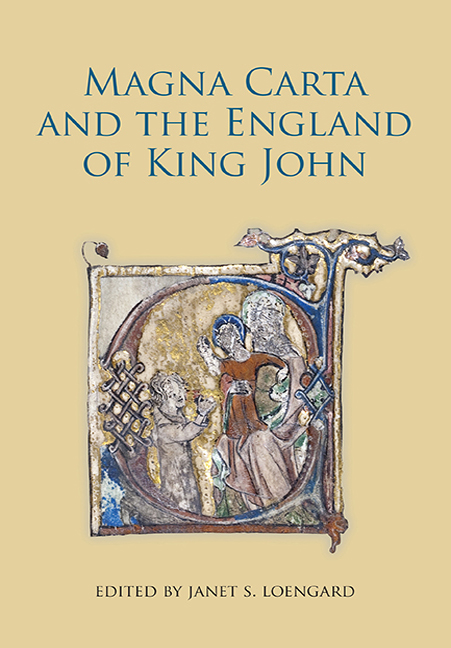Book contents
- Frontmatter
- Contents
- List of Contributors
- List of Abbreviations
- Introduction
- England in 1215: An Authoritarian Angevin Dynasty Facing Multiple Threats
- The Anonymous of Béthune, King John and Magna Carta
- Baronial Paranoia in King John's Reign
- The Forest Eyre in the Reign of King John
- The Managerial Revolution in the English Church
- Magna Carta, the ius commune, and English Common Law
- Justice without Judgment: Criminal Prosecution before Magna Carta
- What Did Magna Carta Mean to Widows?
- The English Economy in the Age of Magna Carta
- The Complaint of King John against William de Briouze (c. September 1210)
- Index
Justice without Judgment: Criminal Prosecution before Magna Carta
Published online by Cambridge University Press: 28 April 2017
- Frontmatter
- Contents
- List of Contributors
- List of Abbreviations
- Introduction
- England in 1215: An Authoritarian Angevin Dynasty Facing Multiple Threats
- The Anonymous of Béthune, King John and Magna Carta
- Baronial Paranoia in King John's Reign
- The Forest Eyre in the Reign of King John
- The Managerial Revolution in the English Church
- Magna Carta, the ius commune, and English Common Law
- Justice without Judgment: Criminal Prosecution before Magna Carta
- What Did Magna Carta Mean to Widows?
- The English Economy in the Age of Magna Carta
- The Complaint of King John against William de Briouze (c. September 1210)
- Index
Summary
Reading the criminal cases in the early Lincolnshire assize rolls of 1202, one might conclude that the judicial system was woefully inadequate. Few cases were prosecuted to the extent of the law, and more often than not, the person who appealed the alleged criminal did not bother to appear in court. Cases came before the assize justices either through appeal by the person wronged or their nearest kin or through the process of community action, that is, hue and cry or the opinion of the men of the four neighbouring vills who made presentments of wrongdoing. Not all criminal actions can be represented in these cases, for if they are, we must conclude that English society in the early years of the thirteenth century was relatively peaceful. The cases involve, for the most part, personal violence. Robbery, burglary, homicide, and rape are the meat of the criminal side of the assize cases. Simple thefts did not come before the king's justices, and wounding appeared only when the appellor, the party bringing the accusation, said that the action had broken the king's peace. In this period before Magna Carta and before the Fourth Lateran Council, both of which would dictate a change in the way that criminal cases were tried, the justices could call upon the litigants to undergo the ordeal by water or hot iron or go to trial by battle. But use of these modes of proof was rare. Instead, the parties did not appear in court, or the judges dismissed the cases because there was a flaw in the pleading, or the parties were willing to pay a fine to have the king excuse them.
Using the Lincolnshire assize of 1202, this paper explores the issue of justice without judgment and suggests that people were using the courts as a negotiating tool either to produce a showdown with their adversary or to force the other party into an out-of-court settlement. The drastic modes of proof, in themselves, might have encouraged evasion of trial or out-of-court settlements. While the lack of convictions and the large number of people who did not appear at the trial might strike a modern reader as an indication of irresponsibility in the administration of justice, to the people using the courts apparently it was an adequate system of maintaining order.
- Type
- Chapter
- Information
- Magna Carta and the England of King John , pp. 120 - 133Publisher: Boydell & BrewerPrint publication year: 2010



